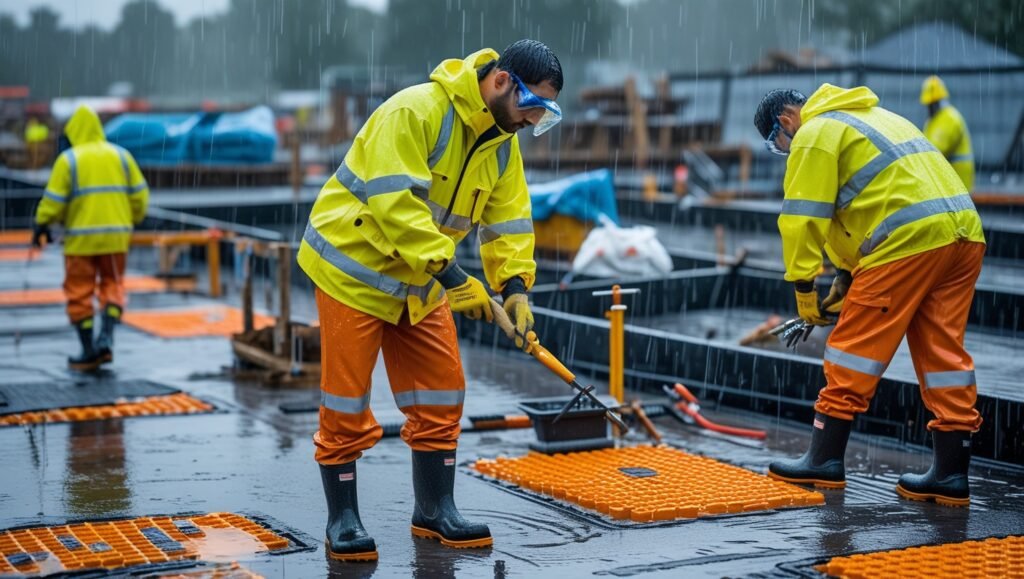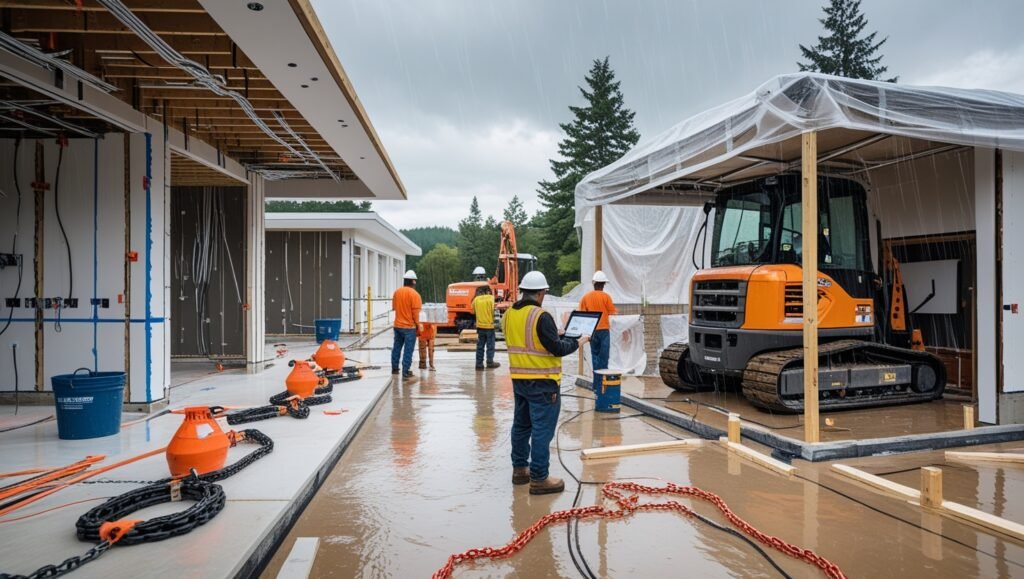Do Construction Workers Work in the Rain?
Construction work often involves battling against the elements, and rain is no exception. While some tasks can proceed safely in wet weather, others must be paused to ensure worker safety and maintain project quality. So, do construction workers work in the rain in 2025? The answer depends on several factors, including the type of work, weather conditions, and safety protocols.
Do construction workers work in the rain? Learn how rain impacts construction work, safety measures, and the types of tasks that can or cannot proceed during wet weather conditions.
Can Construction Workers Work in the Rain?
Yes, construction workers often work in the rain, but this depends on the severity of the weather and the nature of the task. Light rain may not halt activities, but heavy downpours or thunderstorms can lead to delays. Here are key considerations:
1. Task-Specific Decisions
Certain tasks, like excavating or framing, can continue in light rain with proper precautions. However, activities such as pouring concrete or working with electrical systems are highly sensitive to moisture and may require postponement to ensure quality and safety.
2. Safety Hazards
Rain introduces hazards such as:
-
Reduced visibility:
Making it harder to operate machinery and avoid obstacles.
-
Electrical risks:
Exposing workers to potential electrocution if live wires come into contact with water.
Impact of Rain on Specific Construction Tasks

Can Concrete Work Be Done in the Rain?
Pouring concrete in the rain is not advisable as excess water can weaken the mix, compromise curing, and reduce the final strength of the structure. Protective measures like tarps or enclosures are essential if unexpected rain occurs during concrete work.
Do Excavators Work in the Rain?
Excavators can often continue working in light rain, but caution is required to prevent machinery from slipping or getting stuck in muddy terrain. Proper maintenance and anti-skid measures can mitigate risks.
Can Bricklayers Work in the Rain?
Bricklayers may face challenges in the rain since moisture can affect the mortar’s ability to set properly. Shielding work areas and using quick-setting mortar can help reduce delays.
How Does Rain Affect Roofing Work?
Roofing tasks, such as laying shingles, are typically postponed during rain. Wet surfaces can compromise adhesion and increase slip hazards. Roofing crews often use tarps to protect the roof and wait for dry conditions to continue.
Safety Measures for Working in the Rain

To protect construction workers and ensure productivity, companies implement several safety measures:
1. Appropriate Rain Gear
Workers should wear:
- Waterproof jackets and pants.
- Non-slip, waterproof boots.
- High-visibility vests.
- Anti-fog safety goggles.
2. Training and Awareness
Employees are trained to:
- Recognize hazards like live wires and unstable structures.
- Move cautiously to avoid slips and falls.
- Handle equipment with care to prevent accidents caused by wet surfaces.
3. Site Preparation
- Installing appropriate drainage systems will stop water from building up.
- Secure loose materials and equipment to avoid accidents.
- Use rubber mats or platforms to improve traction in slippery areas.
Weather Planning and Project Management

Construction companies often rely on weather forecasts to plan activities. By scheduling indoor or less weather-sensitive tasks during rain, they minimize delays and maintain project timelines. Here are some strategies:
1. Flexible Scheduling
Adjusting schedules to accommodate weather changes ensures critical outdoor tasks are completed during dry periods. Indoor tasks, such as electrical wiring or drywall installation, can be prioritized on rainy days.
2. Equipment Maintenance
Rain can affect the performance of heavy machinery. Regular maintenance checks, including the use of anti-skid chains and waterproof covers, help keep equipment operational during wet conditions.
3. Worker Rotation
Rotating workers ensures no one is exposed to wet conditions for prolonged periods, reducing the risk of cold-related illnesses and maintaining productivity.
FAQs About Construction Work in Rain
1. Does Rain Affect Construction Workers Pay?
Pay policies vary by company and contract. Some workers may receive payment for rain delays, while others might only be compensated for hours worked. In some cases, workers may be reassigned to other tasks during rain to ensure continued productivity.
2. Do Construction Workers Work in Thunderstorms?
No, thunderstorms pose significant risks, including lightning strikes and strong winds. Work is usually halted until the storm passes to prioritize worker safety.
3. Do Construction Workers Work on Weekends or Sundays?
Yes, construction workers often work on weekends, including Sundays, depending on project deadlines and agreements. Rainy weekends may see a shift in priorities to indoor or preparatory tasks.
4. Are Trades Allowed to Work in the Rain?
Trades like roofing, welding, or exterior painting are often paused during rain to maintain safety and quality. However, some trades, such as excavation or interior work, can proceed with precautions.
5. How Does Rain Affect Worker Safety?
Rain increases the likelihood of slips, falls, and other accidents. Proper safety protocols, including the use of high-visibility clothing and slip-resistant footwear, are essential to mitigate these risks.
Challenges and Solutions
Rain introduces numerous challenges to construction projects. But proactive steps can aid in resolving these problems:
1. Delays and Deadlines
Rain can disrupt timelines, especially for weather-sensitive tasks. Solutions include building time buffers into project schedules and rescheduling tasks to align with weather forecasts.
2. Material Protection
Exposure to rain can damage materials like wood, cement, and insulation. Covering materials with waterproof tarps and storing them in sheltered areas minimizes damage.
3. Worker Health
Prolonged exposure to rain can lead to illnesses. Providing heated shelters and encouraging frequent breaks helps workers stay healthy and productive.
Balancing Deadlines and Safety
Rain can cause delays in construction projects, but careful planning can mitigate these setbacks. Companies often:
- Use weather forecasts to plan tasks.
- Adjust schedules to focus on indoor or less weather-sensitive activities during rain.
- Equip workers with appropriate gear to maintain safety and efficiency.
Conclusion
So, do construction workers work in the rain? The answer varies based on safety, task requirements, and weather conditions. While light rain might allow some tasks to continue with precautions, severe weather necessitates halts to prioritize worker safety and project integrity. By implementing proper safety protocols and planning, construction companies can minimize disruptions caused by rain and keep projects on track.
Ultimately, balancing productivity with worker safety is the cornerstone of effective construction management.






